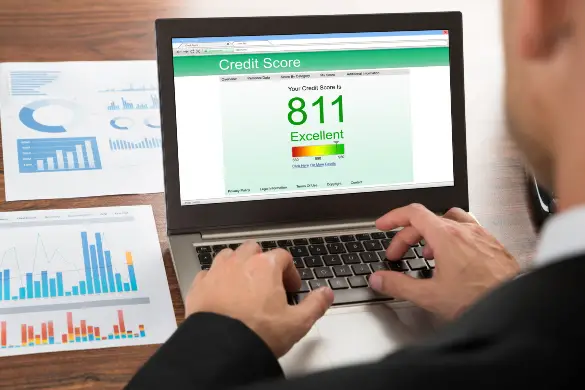
There are several important steps to follow to establish business credit for your LLC startup. Like personal credit, strong business credit can help lower your company’s insurance premiums or interest rates. It can also help you get approved for a business lease, loan, or business line of credit. Building business credit is also one way to separate your personal finances from your business. You may find that you need to sign a personal guarantee when taking out a business loan or opening a business credit card. As a finance professional, this means you will be personally liable for debt if your business is unable to pay it back. This could put your personal assets at risk. However, once you build business credit, you may qualify for a business loan without personal guarantee. Read on to discover how to establish business credit for your LLC startup.
Check out these resources to discover recommendations and guides for getting a business loan:
- Small Business Loan Scams To Look Out For This Year
- What Do Banks Look At When Applying For A Business Loan
- Are Amazon Business Loans The Best Decision For Your Startup?
- Small Business Loans Options To Grow Your Company
- Business Loan Terms And Rates You Need To Know
- VA Business Loans For Disabled Veterans
- Best Secured Business Loans For Your Startup
Pick A Business Structure
First, you need to choose the right business structure to start building credit. Make your organization a distinct legal entity by establishing your business as an LLC, sole proprietorship, partnership or corporation. Once you’ve decided on your preferred business entity, you can begin to register your business. Of course, registration depends on your preferred structure and business location. For example, forming an S Corp in NY requires different steps than forming an LLC in NJ. Certainly, pick a legal entity structure to start establishing business credit.
Here are some links to help you determine the right structure for you:
- 5 Types Of LLC Tax Classification Options For Corporations
- Is A New LLC The Right Structure For Your Startup?
- Which Business Structure Is Right For Your Enterprise?
- How Does An LLC Business Structure Limit Liability?
- How To Choose The Right Business Structure
- Business Structures To Consider For Legal Formation
Obtain An EIN
Once you have incorporated your business as an LLC and created an efficient LLC operating agreement, it is crucial to obtain a federal EIN. An EIN is analogous to a social security number for your company. This number is required on federal tax filings. Moreover, you also need it before you can open a business bank account in the name of your LLC. To comply with IRS regulations, many larger businesses also require an EIN from their vendors to pay them for their services. Obtaining an tax ID number (EIN) is a vital fundamental step that you must take to build business credit when starting up your LLC.
Check out these links for further help on obtaining an EIN:
- How To Apply For An EIN Number
- How To Obtain EIN Number
- What Is My EIN Number? How To Find
- How To Obtain A Nonprofit Tax ID Number
- Cases When To Apply For A New Tax ID Number
- How To Get A Tax ID Number For Business
Get A D-U-N-S Number
Next, get a DUNS number for your LLC. This is your business’s identifying number for the major credit reporting bureau, Dun and Bradstreet. Go online and check if your business already has an existing DUNS number. If you don’t have one, you can request one for free. Of course, if you use other credit reporting agencies, you will need different identifiers. However, you don’t have to request a business identifying number to access your reports. Certainly, get a DUNS number when building credit for your LLC startup.
Build A Foundation
Before you can build strong credit for your LLC startup, you need to build a foundation for your business. You need to make sure that your business itself is established before you can start to foster lasting positive credit relations with other companies. Of course, confirm if you plan on creating an LLC partnership. Your business should have a phone number and be listed in your local print and online directories. Ideally, your company should have a website to further show your credibility. You will also want to open a bank account specifically for your business in your legal company name. You should start using this account to regularly pay your LLC’s bills. Importantly, opening a business credit file is essential to start building credit. It is essential to build a foundation for your LLC startup before you can establish business credit.
Of course, building a solid business foundation requires proper planning. Check out these links before you apply for business credit:
- Loan APR Guide To Build A Solid Financial Foundation
- Compare Banks To Provide Solid Foundation
- Product Naming Secrets To Build A Solid Marketing Foundation
- Starting A Concrete Business With A Solid Foundation
Apply For Credit In Your LLC’s Name
Once you have built a sturdy foundation for your business, the next step is to apply for credit in your LLC’s name. There are several different types of credit that may suit your LLC’s needs. For example, service credit is the easiest form of credit that you can establish for the first time. This form of provider covers internet, phone, satellite TV, web hosting, and other utilities. Depending on your industry, you also might consider vendor, supplier, or retail credit. Perhaps the most important tool to separate your personal purchases from your business purchases is a secured or unsecured business credit card. It is essential that you apply for a business credit card that only reports to business credit agencies. This way, you can protect your personal credit. Applying for credit in your LLC’s name is another significant step towards establishing business credit.
Of course, there are many consideration when opening a business bank account such as:
- How To Choose The Best Bank For Checking
- What Are The Bank Bonus Offers For Business Funding
- How To Receive Bank Reconciliation
Choose The Right Credit Card
Then, after your account is established, find the right card for your LLC. First, ensure the card you choose reports to business credit agencies only. Also, depending on your LLC, consider looking into co-branded credit cards. Of course, review interest rates, annual fees and other financial terms associated with the business card. Then, look into other benefits they offer. For example, some business cards offer features such as cash back, gas rebates, reward points, airline miles and savings on supplies. Certainly, choose the right business credit card for your LLC.
Check out these links to learn how to apply, maintain and use your business credit card:
- Steps To Applying For A Business Credit Card
- What To Do If You Lost Your Business Credit Card
- How Balance Transfer Works For A Business Credit Card
- How Many Credit Cards Is Too Many?
Make Payments On Time Or Early
After you have received credit approval, it is critical that you make payments on time or early to stay in good credit standing. Consistent timely payments are one of the key factors to ensure a good credit score. It is worth noting that some top creditors only assign perfect credit scores to those who pay early. A long credit history can help your business with loan approval in the future, such as a loan to buy a business. So, the sooner that you start establishing business credit, the better. It is wise to limit your business credit 20% to 30% of your maximum credit limit to help raise your company credit score. Making payments on time or early is an essential step to establishing good credit for your LLC.
Borrow From Lenders Who Report To Credit Bureaus
If you are making your credit payments on time and in full, the next step to establishing your credit is borrowing from lenders who report to credit bureaus. Ideally, you want your lenders to report to one or more of the main three credit bureaus: Dun & Bradstreet, Experian, or Equifax. Luckily, most traditional types of lending institutions regularly report borrower’s repayment histories to business credit bureaus. However, some online lenders do not file these reports. To ensure that you build credit, you will want to check your lender’s policy. Aside from your lender, it is wise to maintain current credit reports with all three bureaus to monitor your credit. Borrowing from lenders who report to credit bureaus is an essential step your business needs to build credit and improve your financial standing.
To learn more about borrowing from lenders, check out the following links and guides:
- Small Business Lenders For Multiple Financing Options
- Compare Small Business Lenders For Online Financing
- Secure A Long Term Business Loan From Lenders
- Keep Your Credit Score Healthy To Impress Lenders
- How To Compare Online Commercial Property Lenders
- Asset Based Lenders Improve Business Finances
Monitor Your Credit
Finally, monitor your credit to track progress. Consider reviewing your credit with a major credit reporting agency or wealth management company. They can check your reports and determine if your accounts are helping or hurting your scores. If performing negatively, they may advise you to add an additional credit reference. More so, monitor your credit to spot mistakes. If there are any errors, contact your credit bureau, report the mistake and file a dispute. Of course, if needed, there are various ways to fix your credit score fast. Certainly, monitor your credit to track progress.
Of course, enterprises around the world need to know how business credit works such as:
- How Building Business Credit Can Help Obtain A Startup Loan
- How Business Credit Scores Drop And How To Address The Change
- What Buying Tradeline Can Do For Business Credit
- How To Access Free Online Credit Checks
There are several important steps that your LLC needs to take to build credit, especially as you are just starting to grow your business. After getting the money to start your business, you need to pick a business structure. Then, you need to obtain a federal tax identification number (EIN). Next, you need to use this number to start building a foundation for your business and open a bank account for your LLC. Once you have built this foundation, you can apply for the type of credit that best suits your company’s needs. Of course, choose the right credit card for your LLC. After you have obtained credit approval, you need to make payments on time or early to start building a good credit score. Of course, be sure to borrow from lenders who report to credit bureaus to get recognition for your efforts. Finally, monitor your credit to track progress. Consider the above essential steps to establish credit to fund future growth for your LLC start up.
There are various FAQs every enterprise owner should know when establishing business credit for the first time. More than 30% of small-businesses are denied by creditors because of ownership’s personal credit score ratings. With good business credit, business owners can access increased funding options, cost-effective interest rates and lucrative business contracts. To establish financial credibility, you should consider multiple factors before opening a company line of credit. Read on to discover the FAQs about establishing business credit every owner should know.
How Does Business Credit Work?
First, as a business owner looking to establish a line of credit, you should understand how business credit works and why credit scores may drop. Typically, business credit reports are generated by vendors, suppliers or creditors. These reports contain information on company-specific accounts and operations that are exposed to established credit bureau. Of course, these business-based activities help develop the data that drives your business credit score. In fact, some business credit scores consist of your personal credit file and business-related repositories. As a result, you should talk to your financial provider about what can impact your business credit account. Certainly, understand how business credit works when establishing it for your enterprise.
Who Needs Business Credit?
Secondly, you should learn what type of business entities can establish business credit. Owners of any business structure can open a business credit account, including LLC’s, C Corps and S Corps. In fact, you can even establish business credit if you are operating as an independent contractor or a sole proprietor. Of course, ensure your organization is functioning as a legal business entity when establishing business credit. This is the only way to truly separate your personal credit from your business-based credit ratings. Surely, you should know the different structures capable of starting business credit.
How Long Does It Take To Build Business Credit?
Another FAQ for establishing business credit is understanding how long obtaining credit can take. There is no standard duration when establishing business credit. Each situation is unique since there are several variables that can affect your credit score and rating. For example, scores can be impacted by your business’s financial performance such as truck financing issues, your suppliers and whether they report to credit bureaus. More so, the size of your company rarely affects the time it takes to organize business credit. On the other hand, high profile public companies may have a quicker process because they present a more data-rich selection. Certainly, you should know that the length of establishing business credit depends on your processes, finances and data.
Building business credit can be hard, check out these posts for help:
- How To Build Business Credit For Startup Loans
- Tips To Build Business Credit To Get Loans For Future Expansion
- How To Build Business Credit Fast For Maximum Scalability
What Credit Score Does A Starting Business Have?
Of course, as a new business owner, you should know what your starting credit score is. Usually, new companies are known to possess non-existent or low-rated credit scores for about the first six months of business. It takes time, energy and financial success to build a good credit score. Begin building business credit by starting a business bank account. Plus, consider opening up a few tradelines with various net-30 vendors. These vendors report to credit agencies regularly, which can help boost your credit score. Certainly, remember to payoff your balance in full every month to avoid late payment fees and negative score performance. Surely, new business owners should know what their credit score is when opening their company.
Starting a bank account can be stressful, check out this links for help:
- Business Bank Account With No Fees
- Requirements To Open A Business Bank Account
- Mistakes When Opening A Bank Account
- Open A Basic Bank Account With Bad Credit
- Bank Account Definition Allows Banking
- Virtual Bank Account For Business
Why Separate Business And Personal Credit?
Finally, learn why you should separate your business credit from your personal credit. When forming an LLC or corporation, separate your credit histories to minimize possible negative event effects on your score. For example, if you have a loan that is impacting your personal credit or have debt, it won’t affect your business credit performance and vice versa. So, if you have intellectual properties as your business assets, they won’t be affected if you experience personal financial complications. In fact, by proving clear separation between accounts, your personal assets are protected against collateral repercussions.Therefore, if you neglect a business loan or balance, your personal property is safe from repossession. Certainly, you should learn about separating your business and personal credit.
Of course, you want to keep your business assets separate from your personal accounts. Check out these resources to learn more about dividing your business and personal entities.
- Differences Between Personal And Business Insurance
- Personal VS Professional: How to Handle Business Like A Boss
- A Car Supports Personal Finances And Online Business
- Prevent Employee Burnout Through Work Life Balance
There are several FAQs every company owner should know when establishing business credit for the first time. First, understand how business credit works and what impacts your credit score performance. Secondly, you should know if your business entity is capable of establishing business credit. Next, business owners should know that the time to build business credit depends on their financial status, suppliers and data available to the bureaus. Of course, you should learn about what your credit score starts off as and how you can build it over time. Finally, understand the separation between business and personal credit to protect your assets. These are various FAQs every business owner should know when first establishing business credit.
 Business First Family Business, Accounting, Finance, Investing, Marketing And Management
Business First Family Business, Accounting, Finance, Investing, Marketing And Management





